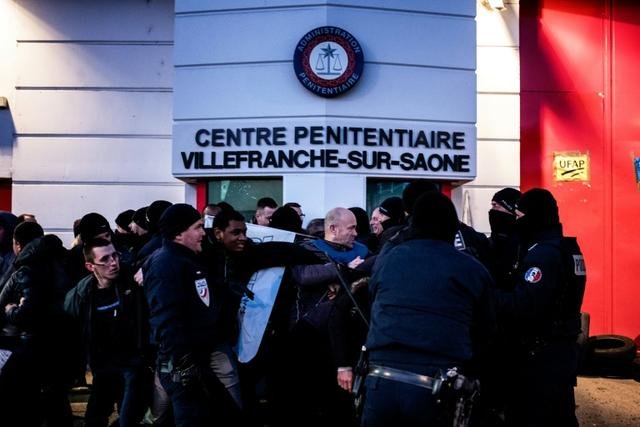
Paris (AFP) - A string of assaults on prison guards prompted a second day of strikes at jails across France on Tuesday, casting a spotlight on security problems and radicalisation inside French facilities.Three brutal attacks in less than a week were the last straw for many guards, who have long warned they face impossible odds at prisons often packed far beyond capacity.More than half of France's nearly 190 prisons and detention centres were hit by strikes Tuesday, with managers entering negotiations with guards at some sites, the prison agency said."These assaults can happen at any facility, whether the inmates are radicalised or not," said Christopher Dorangeville, head of the CGT Penitentiaries labour union.Besides low pay, insufficient staffing and overcrowding -- the Fresnes prison near Paris is currently at 200 percent capacity -- guards now warn they are increasingly at risk from inmates under the sway of Islamic extremists.Tensions had already been running high after two inmates at Fresnes were caught discussing a planned attack just days before they were due to be released last October.The most serious attack occurred last Thursday when a German convict linked to Al-Qaeda, Christian Ganczarski, injured three guards at a prison in northern France with scissors and a razor blade.Ganczarski, accused of orchestrating the 2002 suicide blast at a synagogue in Tunisia which killed 21 people, lunged at the guards after hearing he may face extradition to the US in connection with the 9/11 investigations.- Scant resources -On Monday, a convict at the Mont-de-Marsan prison in southwest France attacked guards as he resisted a search.Seven guards were hurt, including two officers with broken bones, Ludovic Motheron, a CGT official at the prison, told AFP.The inmate, known for his "extreme violence", had been under surveillance for a risk of "radicalisation".On Tuesday, an inmate under surveillance for extremist views sucker punched a female guard in the face at Tarascon prison near Marseille."We don't have the resources in terms of people or equipment to handle this.We don't have the training to handle radicalised detainees," said Guillaume Pottier of the UFAP-UNSA union.The government has made stopping the spread of Islamic radicalisation in prisons a priority, following jihadist attacks over the past two years that have left more than 240 people dead.Some of those responsible were involved in Islamist networks in jail, including Cherif Kouachi, one of the gunmen who attacked satirical magazine Charlie Hebdo in January 2015, and his friend Amedy Coulibaly, who killed four at a Jewish supermarket two days later.But there have been mixed results so far from efforts to deal with radicalised prisoners -- including people who went to fight for the Islamic State group in Syria and Iraq -- and stopping them from converting fellow inmates.French prisons house about 500 people charged with terrorism offences, and about 1,200 inmates are identified as having extremist views."De-radicalisation efforts were set up very quickly, and there are lots of gaps," said Esther Benbassa, a senator who recently led an investigative commission on the issue.- New approaches -In November the government revealed it had been experimenting with a "de-radicalisation" programme for 14 inmates -- eight men and six women -- held in open custody, overseen by a team of educators, psychologists and religious authorities.But for Benbassa, who met the inmates in December, "these aren't the type of people who attack prison guards"."English classes, yoga, geopolitical studies, interviews -- all that is very nice, but the results aren't extraordinary," she said."The programme isn't for all cases," she told AFP.President Emmanuel Macron has promised to present an overhaul of French prisons by the end of February.